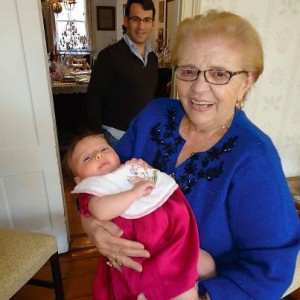 Of all the liminal stages and rituals that exist, everyone’s least favorite is, of course, the funeral. In a life filled with baptisms, weddings, and birthday parties, the funeral is the Eeyore of rituals: solemn, sorrowful, and downright depressing. But, like Eeyore, they serve a purpose that’s as important as those fulfilled by their other more cheerful, more colorful colleagues.
Of all the liminal stages and rituals that exist, everyone’s least favorite is, of course, the funeral. In a life filled with baptisms, weddings, and birthday parties, the funeral is the Eeyore of rituals: solemn, sorrowful, and downright depressing. But, like Eeyore, they serve a purpose that’s as important as those fulfilled by their other more cheerful, more colorful colleagues.
A week ago today we buried my aunt, Thitsa Lilia, on an improbably gorgeous fall day. To paraphrase P.D. James, “It was one of those perfect New England autumnal days which occur more frequently in memory than in life.” My godmother later said to me that the weather was “as bright and beautiful as your aunt’s heart.”
The loss of my aunt is so profound that I prefer not to think about its impact on our family. In my travel memoir, North of Ithaka, I described the thitsas, my aunts, as having “carefully maintained bouffants that were as high as their self-esteem,” and wrote, “most people use the term Greek chorus figuratively. Well, I have the real thing, live and in person, a supporting cast made up of my four aunts…None of them is over five feet tall—in fact, they resemble Flora, Fauna, and Merriweather, the fairy godmothers in Sleeping Beauty, more than any chorus in a Greek tragedy. But they fulfill the same function: commenting on any action taking place in my life, interpreting oracles, explaining the past, and making predictions for the future.”
I described the thitsas, my aunts, as having “carefully maintained bouffants that were as high as their self-esteem,” and wrote, “most people use the term Greek chorus figuratively. Well, I have the real thing, live and in person, a supporting cast made up of my four aunts…None of them is over five feet tall—in fact, they resemble Flora, Fauna, and Merriweather, the fairy godmothers in Sleeping Beauty, more than any chorus in a Greek tragedy. But they fulfill the same function: commenting on any action taking place in my life, interpreting oracles, explaining the past, and making predictions for the future.”
Some combination of the thitsas could often be found at the kitchen table in my parents’ house, and it usually included Thitsa Lilia. It was there that she taught Amalía, then six months old, to bang on the table with glee, an action she still performs daily, if not hourly. Without Thitsa Lilia around it, it seems as if the kitchen table should not exist anymore either.
 But her funeral last week, while incredibly sad, was also, shockingly, fun at times. My mother likes to quote the Italian saying, “there’s no wedding without tears and no funeral without laughter,” and that was true last week, especially when Amalía amused everyone by toddling around the church hall during the reception luncheon after, strewing oyster crackers in her wake. The funeral was packed (Thitsa Lilia would have loved it), so I got to see relatives I usually only meet with at Christmas, if that. My cousins, Thitsa Lilia’s sons, had created bulletin boards covered in photos of her life, so I got to relive moments that I hadn’t even been around for the first time around–Thitsa Lilia’s trips to Greece, the Thanksgiving dinner she cooked as young mom, her wedding day. I especially liked how they included everyday snapshots–including her sleeping on the couch in our house one summer afternoon–along with red-letter days.
But her funeral last week, while incredibly sad, was also, shockingly, fun at times. My mother likes to quote the Italian saying, “there’s no wedding without tears and no funeral without laughter,” and that was true last week, especially when Amalía amused everyone by toddling around the church hall during the reception luncheon after, strewing oyster crackers in her wake. The funeral was packed (Thitsa Lilia would have loved it), so I got to see relatives I usually only meet with at Christmas, if that. My cousins, Thitsa Lilia’s sons, had created bulletin boards covered in photos of her life, so I got to relive moments that I hadn’t even been around for the first time around–Thitsa Lilia’s trips to Greece, the Thanksgiving dinner she cooked as young mom, her wedding day. I especially liked how they included everyday snapshots–including her sleeping on the couch in our house one summer afternoon–along with red-letter days.
I learned some folklore surrounding funerals, too–that some Greek women don’t wear makeup to funerals, because it’s a sad occasion. (I know how Thitsa Lilia appreciated a put-together lady, so I had my hair colored for the occasion and broke the makeup rule as well.) And I remembered what my father always says when he comes home from a wake or a funeral, that you have to stop somewhere on the way home, even if it’s just to buy a candy bar, so that death doesn’t follow you home.
Last week made me realized that funerals exist so that the bereaved can gather together to celebrate the life of the person who died, to take some comfort in each other, to be forced to confront their sorrow, and, perhaps most of all, to feel grateful for the time they had with the deceased, even if it wasn’t enough.
I gave a eulogy at Thitsa Lilia’s funeral, which I will reprint below. I enjoyed writing it because it forced me to think about what her life meant to me, as opposed to what her loss would mean. I am grateful Thitsa Lilia lived long enough to meet my husband and my daughter, and to dance at her baptism. And I hope that she is dancing with her husband, who died 19 years ago, right now.
Although she’d been battling her illness for years, Thitsa Lilia’s death came as a shock for us. As my sister, who lives in from California said, Every time I came home, she was always there. I think we all thought she would always be there.